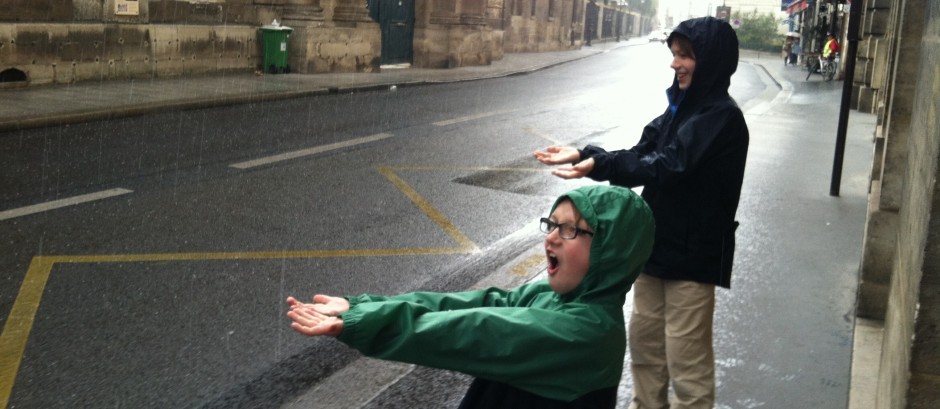A few weeks ago I took Isaac in for his three-year check up at the doctor. I’m not proud of it, but I’ll admit a certain smug confidence, similar to that of an 8th grade French student who believes she will ace a test. I felt sure that the doctor would be very impressed with Isaac and all his skill and learning, all his wisdom, his vocabulary and the vast scope of his many fields of knowledge. I expected, in effect, that the doctor would give me an “A” on mothering and that Isaac would get an “A-plus” on being himself. It’s pathetic that I would want or need this sort of validation from an authority figure, but sadly, true!!
I pictured Isaac coming in to the examining room and talking about the formation of the moon. Or maybe he would tell about the interconnecting predator/prey relationships between crabs, octopuses, and moray eels. Or maybe I would say to him, as Ben recently did, “Could I land my spaceship on Jupiter?” and he would reply tartly, little index finger in the air, “No, you can’t, because it’s a gaseous planet!” Or maybe he’d enact a scene from Beatrix Potter’s “Samuel Whiskers” in which he says to me, “Anna Maria, you didn’t fetch enough dough!” and I come back with a cranky, “I fetched as much as I could carry!” Or maybe he would come in with his little briefcase-like tool box (from the library) and say, as he did last night when I was trying to get him ready for bed, “Mommy, I have FAR too much work to do to waste time on jammies!” Or maybe he’d ask one of those dazzling, puzzling questions he asks, like “Mommy, why dogs don’t have hands and can’t do shovels?”
But no. Here’s what he said in the doctor’s office: “Ba-ba!”
A whole different way of handling the doctor. Of course! I should have expected it. He reverted to being a baby. He buried his head in my lap and pretended he couldn’t talk– whatsoever. The doctor looked down at him with concern. “Can he talk?” he asked.
“Oh, yes!” I said. “He talks!”
“Well, does he say complex sentences, with more than four words?”
“Yes!” I said, but somehow I felt that I couldn’t begin to explain HOW COMPLEX a talker he is. And something about the whole situation smacked of a mother who thinks her son is way more advanced than the facts bear out. I felt a “protest too much” problem in the air.
“Does he know his shapes?” asked the doctor.
“Yes, he knows his shapes,” I said, wanting to add, “Listen, this kid talks about black holes all the time! He talks about stars collapsing! He’s way past shapes! He’s asking why we’re diurnal!”
The doctor decided to test Isaac. He drew a simple series, a triangle, a circle, and a square. “What’s this?” he asked.
“Ba!” said Isaac. “Ba-ba!”
“Isaac,” I said, trying to remain calm, pointing to the triangle, “Isn’t this a nice circle?” (I was hoping he would correct me.)
Nothing. Nada. He would not cooperate or participate in any way. During the examination he could have easily mentioned that his “testicles are private!” But no. He just cried. He wanted to get out of there, pronto. He wouldn’t jump or hop or tell what the items were on the eye chart. In effect, he wouldn’t do anything that would in any way allow the doctor to measure his mental development.
I wondered whether this was a harbinger of the future—if he’s going to be one of those very smart kids who never tests well. And I’ll have to live with the frustration of knowing that he’s amazing, but not being able to prove it, and just being written off as yet another mother who groundlessly believes her son is amazing.
Well, if that’s my fate, so be it. Even if he can’t or won’t prove it to others, I know the truth.
